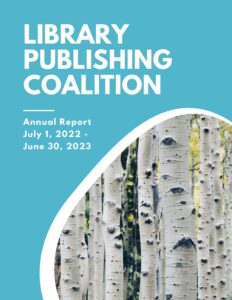October 19, 2023
By Nancy Adams
The Library Publishing Forum is an annual conference bringing together representatives from libraries engaged in or considering publishing initiatives to define and address major questions and challenges; to identify and document collaborative opportunities; and to strengthen and promote this community of practice. The Forum includes representatives from a broad, international spectrum of academic library backgrounds, as well as groups that collaborate with libraries to publish scholarly works, including publishing vendors, university presses, and scholars. The Forum is sponsored by the Library Publishing Coalition, but you do not need to be a member of the LPC to attend.
The Library Publishing Coalition (LPC) is now accepting proposals for the 2024 Library Publishing Forum to be held at the McNamara Alumni Center at the University of Minnesota in Minneapolis, MN on May 15 and 16, 2024! Proposals may address any topic of interest to the library publishing community. The proposal deadline is November 20, 2023.
Note: The deadline for submitting proposals has been extended to December 15, 2023.
Proposal submissions for the Forum are welcome from LPC members and nonmembers, including library employees, university press employees, scholars, students, and other scholarly communication and publishing professionals. We welcome proposals from first-time presenters, representatives of small and emerging publishing programs, and employees of non-member institutions.
We are committed to expanding the diversity of perspectives we hear from at the Library Publishing Forum. Working towards some of the “Continuing Initiatives” from the LPC Roadmap for Anti-Racist Practice, we ask all proposals to explicitly address how they are inclusive of multiple perspectives, address DEI, or incorporate anti-racist and anti-oppressive approaches. Presentations about specific communities should include members of that community in their speaker list, and for sessions with multiple speakers, we seek to avoid all-white and all-male panels.
Learn more about session formats and submitting on the Forum program web page.
Submit a proposal
LPC Program Committee
Elizabeth Bedford, University of Washington (2023–2024 co-chair)
Jennifer Coronado, Butler University (PALNI) (2023–2024 co-chair)
Jason Boczar, University of South Florida
Corinne Guimont, Virginia Tech
Loftan Hooker, Virginia Commonwealth University
Alexandra Marcaccio, University of Guelph
Emma Molls, University of Minnesota (host liaison)
Melanie Schlosser, Library Publishing Coalition

 “I feel extremely humbled and honored to have been awarded LPC’s Award for Exemplary Service this year. It was a true pleasure to serve on LPC’s Board and while the work I did as the Treasurer over the past two years, and last year especially, was challenging, I am thankful for the opportunity to help serve our community. The care, thoughtfulness, and support that my fellow Board members and the community provided during the challenging season of having to rethink our financial model and increase our dues for the first time was so exemplary and made my job much easier than it could have been. It’s a beautiful example of why I love and value this community so much! I have grown significantly through my service as Treasurer, and I’m thankful that I was given the opportunity to help our community navigate through this change and help to position the LPC for continued success and stability for years to come. Thank you!”
“I feel extremely humbled and honored to have been awarded LPC’s Award for Exemplary Service this year. It was a true pleasure to serve on LPC’s Board and while the work I did as the Treasurer over the past two years, and last year especially, was challenging, I am thankful for the opportunity to help serve our community. The care, thoughtfulness, and support that my fellow Board members and the community provided during the challenging season of having to rethink our financial model and increase our dues for the first time was so exemplary and made my job much easier than it could have been. It’s a beautiful example of why I love and value this community so much! I have grown significantly through my service as Treasurer, and I’m thankful that I was given the opportunity to help our community navigate through this change and help to position the LPC for continued success and stability for years to come. Thank you!”



